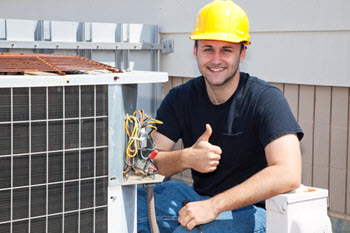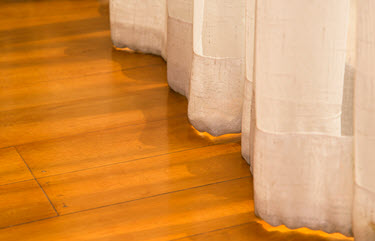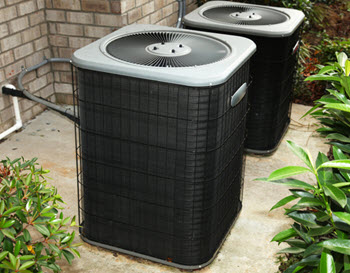 During the summer months, your indoor temperature should be even throughout the house to keep you comfortable whether you are downstairs in the kitchen or lounging on the second floor. Now you are probably wondering what to do to make sure that the temperature upstairs matches the temperature downstairs. Does lowering the thermostat help? Find out what you should do to ensure that every part of the home is cooled adequately and why some areas of the house tend to have a lower/higher temperature than others.
During the summer months, your indoor temperature should be even throughout the house to keep you comfortable whether you are downstairs in the kitchen or lounging on the second floor. Now you are probably wondering what to do to make sure that the temperature upstairs matches the temperature downstairs. Does lowering the thermostat help? Find out what you should do to ensure that every part of the home is cooled adequately and why some areas of the house tend to have a lower/higher temperature than others.
Air Conditioner Service Lawrenceville NJ: Why Is My Second Story Hotter Than the Ground Floor?
Contents
Let’s take a look at the common reasons why the second story of your home typically has a higher temperature than the ground floor. We will also identify the options you have to fix the problem/s.
Understanding Attic Insulation And Hot Air
We learned from grade school science class that hot air rises, which explains why the ground floor cools down much faster and the second floor is generally warmer. The type of building materials used in the house can also affect how well the air conditioner works. Some materials, for example, absorb and retain heat better. This circumstance can present some challenges for homeowners. Ceilings and walls that retain heat during the summer months require more work from the air conditioning unit. To prevent this, energy experts suggest installing insulation in the attic. Insulation helps maintain the temperature of ambient air. Hence, it aids in keeping the air in the home cooler. Insulation is also a big help during the winter months because, similarly, this will help maintain an even temperature indoors.
To determine how well insulation can work, check its R-value. The best types of insulation are those with a higher R rating. According to the U.S. Department of Energy, homes should install specific types and levels of insulation based on their climate zone. Based on this recommendation, it is vital that you consider insulating your attic and other parts of the house based on your local climate zone. It is also prudent to use roofing materials that reflect heat instead of absorbing it.
How Window Treatments Can Help Balance Temperature
 Window treatments are a simple and often overlooked solution. Surprisingly, they are also quite efficient. Consider this: one of the reasons why your ground floor is cooler than the second floor is that you may have plants, shrubs, and trees nearby that help keep the sun’s heat out. Since the second story tends to be more exposed, it is often warmer than the ground floor. When you control direct sunlight, the interior of your home will be much cooler.
Window treatments are a simple and often overlooked solution. Surprisingly, they are also quite efficient. Consider this: one of the reasons why your ground floor is cooler than the second floor is that you may have plants, shrubs, and trees nearby that help keep the sun’s heat out. Since the second story tends to be more exposed, it is often warmer than the ground floor. When you control direct sunlight, the interior of your home will be much cooler.
To fix this problem, use window treatments such as shades and blackout curtains that will reduce the amount of light that enters the second story of the home. Curtains work well in helping keep room temperatures low. However, it is also essential to ensure that the HVAC system is optimized to ensure that it works efficiently. Always check that your HVAC system is clean and maintained and that you clear the vents and air filters regularly. An optimized system works best in cooling air efficiently. Turn the HVAC fan instead of relying on the auto function. Manually setting the fan will ensure that air is circulated throughout the house. Check the insulation of the doors and windows as well, particularly during the hot and cold seasons.
Address The HVAC Unit That Is Cooling Your Home
The HVAC unit should be capable of maintaining a cool and comfortable temperature inside the home. If the upper floor of your home is still warmer compared to the ground floor, call an HVAC contractor immediately. They can check the system and identify any issues right away.
In general, the area closest to the HVAC unit tends to be the coolest in the home. As such, it takes a while to bring down the temperature of the second story. To ensure even cooling, the insulation in the ductwork should be intact. It is also important to schedule a yearly AC tuneup. With regular maintenance, HVAC professionals can identify potential problems right away and resolve them. If an issue is not addressed, it could lead to more severe damages. As long as the ductwork and the unit are maintained, the system should work well. Your HVAC contractor can also recommend other methods that will help maximize the function of your HVAC system.
Does Your HVAC Unit Require A Replacement?
 One of the most common reasons why an HVAC system does not work well is that it does not match the size of your home. If the unit is too small, it will not be enough to cool down a room, especially for prolonged periods. Regardless, the air conditioner would still fail to lower the temperature of the room. If, on the other hand, the unit is too big, it will simply cycle on and cycle off quickly.
One of the most common reasons why an HVAC system does not work well is that it does not match the size of your home. If the unit is too small, it will not be enough to cool down a room, especially for prolonged periods. Regardless, the air conditioner would still fail to lower the temperature of the room. If, on the other hand, the unit is too big, it will simply cycle on and cycle off quickly.
Either way, you will notice a significant increase in your energy bills. If you want to understand exactly what your cooling requirements are, call your HVAC contractor for an accurate calculation and estimate.
You can expect your HVAC unit to serve you for many years without problems. However, with age comes the usual wear-and-tear issues. If your home AC is ten years old or older, you might want to consider a replacement. The unit will likely require major repair or is no longer working efficiently, which means you may be spending more.
Newer HVAC systems can also outperform older units because they are more energy efficient. Be sure to contact us today to find out more about how we can help you improve your home comfort.
Call The Professionals At PFO Heating & Air Conditioning
When looking for an HVAC contractor, choose a company that offers a range of services for your needs, such as HVAC tune-ups, repairs, and replacements. If you require highly qualified and trained HVAC technicians, call PFO Heating & Air Conditioning.
We can help you identify problem spots in your home, check your cooling requirements, and ensure that both your upper and lower floors are cooled evenly and efficiently. Call PFO Heating & Air Conditioning to schedule an appointment today.
Some of the areas we service include Lawrenceville, Pennington, Princeton, Trenton and these zip codes 08648, 08534, 08540, 08601 as well as all surrounding areas in Mercer County, New Jersey.
Click here contact us now or call us at (800) 253-9001 to find out more!



